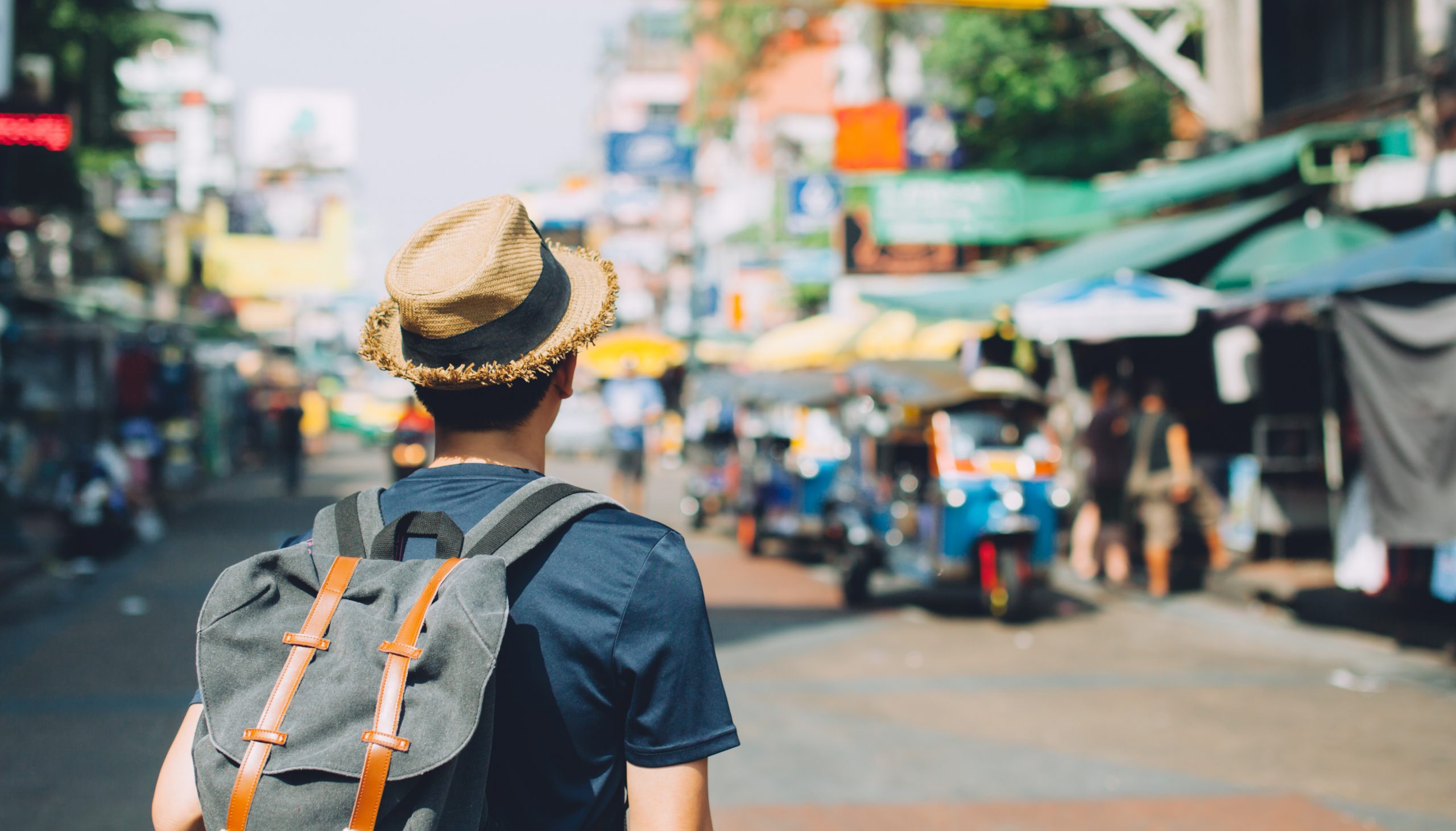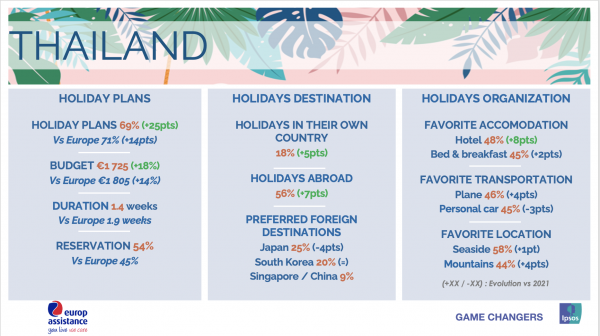
SINGAPORE, 21 June 2022: Europ Assistance announced Tuesday the international findings of its 21st edition of the Holiday Barometer.
Travel expectations are increasing significantly compared to last year, with levels higher than in 2019. In Southeast Asia, the study shows that 69% of Thais intend to travel from June to September, which represents a 25 percentage point increase compared to 2021.

Europ Assistance Group Head of International Travel Julia Ricks says, “This year’s travel intentions reflect a real excitement for travel, overpassing pre-pandemics levels. Compared to 2021, we observe a significant return to international travel and higher average holiday budgets, supported by a significant decrease in Covid-19 related issues favouring air trips and destinations like cities.”
“Ongoing inflation hasn’t stopped but contained this travel enthusiasm after two years of restrictions, but inflation is the most significant travel concern this year. Booking anticipations and the importance of being more covered with trip insurance appear as new habits of holidaymakers that could become durable,” Ricks added.
The average holiday budget should be higher than in 2021, but this increase is limited by the inflation context.
Holidaymakers report a higher travel budget this year than they did in 2021: Americans intend to spend an additional USD440 for a global budget of around USD2,760 (+19% vs 2021). In Europe, the expected holiday budget is around EUR1,800 (+220€, +14% vs 2021). And for the holiday budget, Thais intend to spend strongly with an increase vs 2021 of 18% (THB62,800).
Concerns about inflation and prices increases are much present in peoples’ minds in 2022 and impact the desire to travel this year: it is the case for 69% of Europeans, 62% of Americans, 70% of Canadians, 63% of Australians and 77% of Thais, who say being impacted by this issue. Moreover, financial considerations are mentioned as one of the main reasons not to travel by 41% of Europeans who won’t be going on a trip from June to September (+14pts vs 2021), 45% of Americans (+9pts) and 34% of Thais (+10pts).
While Covid-19 is still a consideration for travellers, it has receded as a concern.
Overall, the global level of concerns regarding all covid-19 related topics is decreasing compared to last year, especially on travel and leisure plans. For 53% of Europeans and 46% of Americans, COVID-19 has an impact on their enthusiasm regarding travel. It is still exceptionally high among the Canadians or the Aussies (60%) and even more among the Thai population (81%).
When they think about their next trip, health issues have still the greatest impact on the Thai respondents’ enthusiasm, followed closely by inflation, even though the level of concern regarding Covid-19-related topics is decreasing. When travelling, Thais are still cautiously picking their destination by avoiding certain countries and favouring destinations nearby.
When thinking about their next trip, for example, Thai respondents still felt concerned about issues related to the health and the Covid crisis, but to a lesser extent than last year. The desire to travel internationally drove the will to get vaccinated.
In almost all countries, the average levels of booking anticipation rose, with far more people booking their holidays sooner than last year than people doing it later. Holidaymakers from Thailand are among the most organized, as more than 50% have already secured at least part of their trip
Covid-19 may also have impacted durably travel insurance habits, as being more covered with travel insurance is the travel habit that appears to be the most durable in almost all countries surveyed. These levels are especially high in the Asia Pacific (Thailand 75%, Australia 54%), in the UK (49%) or in southern Europe (Spain 50%, Italy and Portugal 45%).
Above all, a return to international travel is observed in all the countries: 48% (+13pts) of Europeans, 36% (+11pts) of Americans and 56% (+7pts) of Thais intend to travel abroad from June to September. It is mainly the case in the countries where holidaymakers are more used to travelling abroad: British (+24 pts), Swiss (+7pts) and Belgians (+7pts) will be less homey and will travel more internationally.
When choosing to travel abroad, Thai holidaymakers mostly opt for neighbouring countries, with favourite destinations being Japan followed by South Korea and Singapore. Weather and already knowing the destination are the most important criteria in choosing the destination for Thai respondents. They also plan to choose their destination according to the health risk, including coronavirus infection.
As international travel increases, holidaymakers adjust their mode of transportation. Overall, the two favourite means remain the plane and the car (46% and 45% of Thais prefer these two modes of transportation).
Back to normal?
When asked about the return to “normal conditions” of travel, perceptions vary a lot from one country to another. Australians, Austrians and Thais are the most pessimistic, with half of them thinking the situation will come back to normal in 2024, after, or even never. On the contrary, Poles, Czech and Swiss are the most optimistic, with nearly four out of 10 saying it is already possible.





